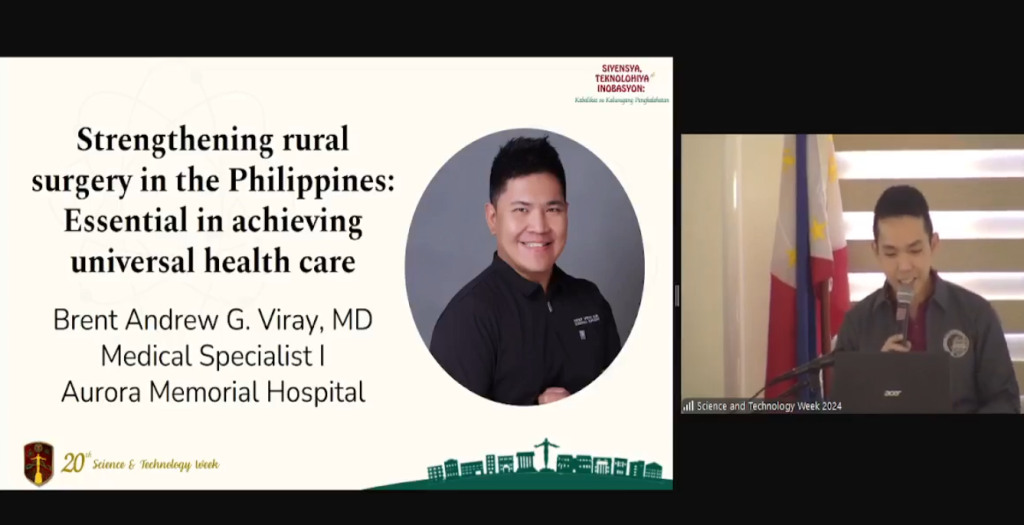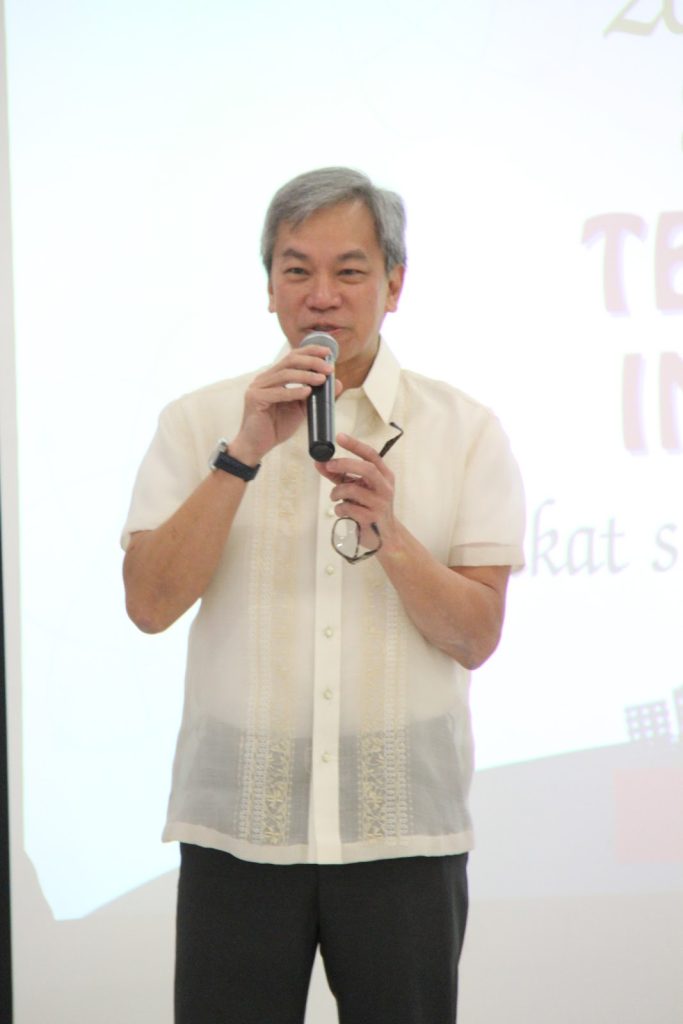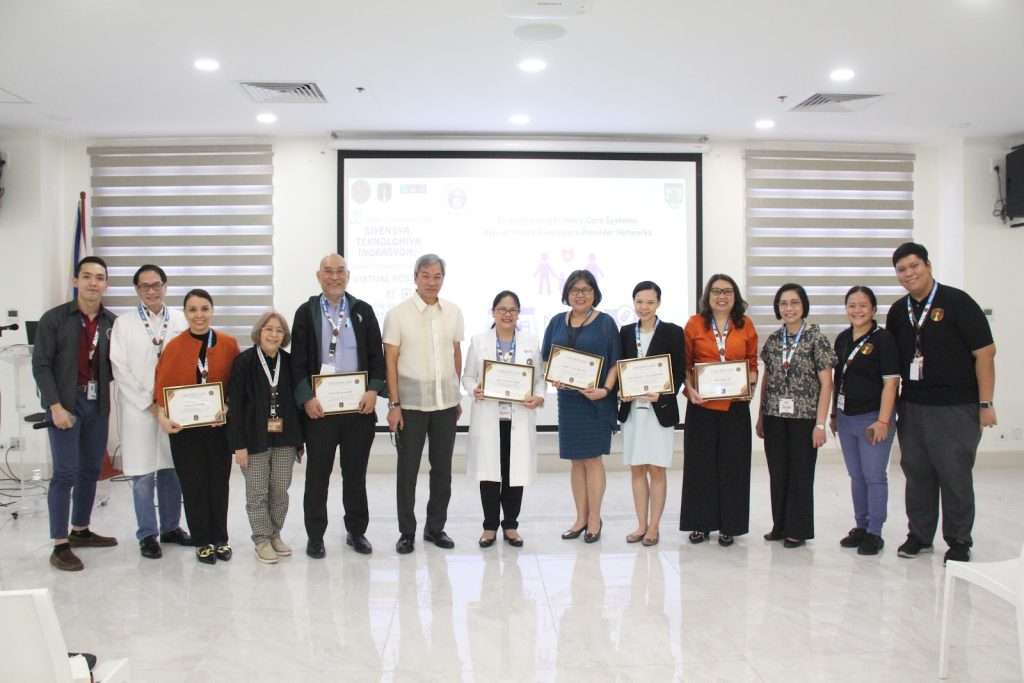Text by Cherry Madrideo
Photos by Joseph A. Bautista

Day 2 of the UP Manila Science and Technology Week’s “Siyensya, Teknolohiya at Inobasyon: Kabalikat sa Kalusugang Pangkalahatan” showcased presentations by the College of Medicine (UPCM) and the Philippine General Hospital (PGH) in the morning and the College of Pharmacy (UPCP), College of Allied Medical Professions (CAMP), and National Teacher Training Center for the Health Professions (NTTCHP) in the afternoon of Nov. 20 at the Henry Sy Sr. Building. The Office of the Vice Chancellor for Research hosted the week-long event from Nov. 18-22, 2024.
UPCM and PGH
UPCM Dean Charlotte Chiong presented the subtheme, “Strategies and Initiatives in the Delivery of Healthcare in Medical Education in Support of Universal Healthcare,” which serves as the anchor for the morning session’s topics. She noted that the college’s research initiatives aim to address gaps in access, quality, and affordability of healthcare services. She encouraged research to be published in the Acta Medica Philippina journal, as it is now indexed in PubMed Central.
Department of Clinical Epidemiology Assoc. Prof. Carol Stephanie Tan-Lim examined the impact of primary care system interventions on healthcare worker satisfaction and its broader implications in her topic, “Impact of Primary Care System Interventions in Healthcare Worker Satisfaction and Intention to Stay in the Philippines: A Follow-up Study.”


Dr. Alvin Marcelo of the Medical Informatics Unit focused on the integration of geographic information systems (GIS) in health information systems for equitable service delivery and stressed that “granular data” is essential in monitoring equitable service delivery, requiring geo-enabled systems in his talk on “The Geography of Universal Health Coverage: Why Geographic Information Systems are Needed to Ensure Equitable Access to Quality Health Care.”
Department of Pediatrics Professor Leonila Dans shared that strengthened primary care led to significant increases in healthcare utilization: 200% increase in rural areas, 350% in remote areas after one year, but inequities persisted, with remote areas still facing greater out-of-pocket expenses as she explored on her topic, “Health Benefit Utilization and Out-of-Pocket Expenses in Outpatient Care and Hospitalizations: Baseline Surveys 3 Primary Care Sites.” She highlighted primary care as the foundation for achieving UHC and addressing inequities in healthcare access.


Dr. Brent Andrew G. Viray, fellow at the Department of Surgery, discussed “Strengthening Rural Surgery in the Philippines: Essential in Achieving Universal Health Care” and pointed out that access to surgical care is a significant gap in public health, particularly in rural areas of the Philippines, and prioritizing rural surgery through policy, training, decentralization, and community engagement is essential to achieving universal healthcare. Collaborative efforts between government, local leaders, and healthcare providers are vital to bridging the inequities in surgical access and improving outcomes for underserved populations.
Dr. Aileen Espina, coordinator for External Linkages and Universal Health Care head of the PGH, stressed in “UP PGH Preparations for UHC” that the PGH is uniquely positioned to lead the transition to an integrated, UHC-aligned healthcare system while maintaining its role as an apex hospital. Through innovative programs, partnerships, and strengthened training for primary care, PGH aims to address systemic gaps, ensuring health professionals are equipped to meet the needs of the Filipino population.


Finally, “UPCM Preparations for Universal Healthcare” was discussed by Assistant Associate Dean for Academic Development Agnes Soriano-Estrella. The UHC Act mandates a paradigm shift in healthcare delivery and medical education in the Philippines, and the UPCM is at the forefront of this transformation, revising its curriculum to prepare future physicians as primary care-ready professionals. By 2030, these efforts aim to create a healthcare system that ensures equitable, quality care for all Filipinos, setting a national standard for medical education reform.

A panel discussion, composed of all the speakers, was held as the culminating activity for the morning sessions

PGH Director Gerardo Legaspi reflected on a graduate who excelled academically in surgery but needed practical knowledge about working in provincial hospitals, such as understanding level 2 hospital operations or health information systems. This gap reinforced the importance of integrating practical health system knowledge into medical education. He noted that Universal Health Care (UHC) is unavoidable and essential for the health system, its implementation remains a challenge, and understanding it must begin during medical education to ensure students gain comprehensive knowledge.

